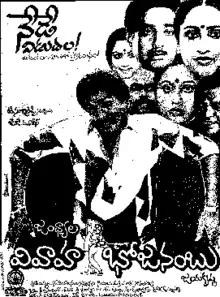| Vivaha Bhojanambu | |
|---|---|
 Theatrical release poster | |
| Directed by | Jandhyala |
| Screenplay by | Jandhyala |
| Story by | Aadi Vishnu |
| Produced by | Jandhyala Jaya Krishna |
| Starring | Rajendra Prasad Chandra Mohan Ashwini |
| Cinematography | Vijay C. Kumar |
| Edited by | Gautham Raju |
| Music by | S. P. Balasubrahmanyam |
Production company | J. J. Movies |
Release date |
|
Running time | 142 mins |
| Country | India |
| Language | Telugu |
Vivaha Bhojanambu (transl. Wedding feast) is a 1988 Telugu-language comedy film directed by Jandhyala who co-produced the film with Jaya Krishna under the J. J. Movies banner. It stars Rajendra Prasad, Chandra Mohan, and Ashwini with music composed by S. P. Balasubrahmanyam. The film's title is the song from the 1957 Telugu film Mayabazar.[1] The original song and its video played during the credits. The film was successful at the box office.[2]
Plot
Seetarama Rao hates women due to his belief that they manipulate and ruin men, and runs an organization against them, teaching members of his organization, including his younger brother Krishna to avoid them at all costs, even going to the extent of denying his sister Subhadra tenancy because of his beliefs. Once a client, Head Constable Nippu Appala Swamy, who has issues with his wife, asks the reason for his beliefs. Rao reveals that long ago, he and Krishna were raised by Subhadra and her husband Vasu. Since childhood, he has been naive and subjected to ridicule. After his maid and her father try to take advantage of him by accusing him of impregnating her, Rao is saved by a woman, Lavanya who pretends to be his wife and tells all that he's had a vasectomy. Surprised at the sudden gesture, Rao falls in love with Lavanya and tries various ways to woo her. Aware of his attempts, Lavanya's braggard cousin Subba Rao, who wants her for himself, threatens him. Unfortunately, on an awkward occasion, Lavanya slaps Seetarama Rao publicly and he contemplates suicide. However, he receives a letter from Lavanya reciprocating his love and the pressure Subba Rao is putting on her. When he rushes to her, Lavanya humiliates him by pushing him into a river, thus fueling Rao's hatred of women.
In the present, Subhadra and Vasu encounter and confront Lavanya over her role in Rao's personality, and Lavanya decides to tell them the truth: that to protect Rao from her cousin she pushed him away. Knowing that Rao won't accept or believe her when she tells him the truth, Vasu proposes an idea. In order to win back Rao, Lavanya with the help of Vasu and Subhadra opens a fake organization against men and moves in across the street from Rao. Meanwhile, Krishna is attracted to Lavanya's sister Vasundhara, and eventually, Seetarama Rao's assistant Kailasam falls in love with Vasu's mute sister Jyothi. Knowing Rao won't accept this, a frightened Krishna elopes with Vasundhara to commit suicide, but Appala Swamy rescues them. In the end, Rao realizes the truth and makes amends. The movie ends with the marriages of Seetarama Rao & Lavanya, Kailasam & Jyothi, and Krishna & Vasundhara.
Cast
- Rajendra Prasad as Seetarama Rao
- Ashwini as Lavanya
- Chandra Mohan as Vasu Rao
- Suthi Veerabhadra Rao as Lingam
- Suthi Velu as Head Constable Nippu Appalaswamy
- Brahmanandam as Kavi
- Subhalekha Sudhakar as Kailasam
- S. P. Balasubrahmanyam as Inspector
- Harish as Krishna
- Vidya Sagar as Subba Rao
- Bhimaraju as Lord Hanuman
- Gundu Hanumantha Rao as Constable 111
- Ashok Kumar as Priest
- Potti Prasad as Simhachalam
- Satti Babu as Lecturer
- Dham as Thief
- Rama Prabha as Durga
- Rajyalakshmi as Subhadra
- Rajitha as Jyothi
- Ratnasagar as Kaveri
- Pavala Syamala as Syamala
- Haritha as Vasundhara
Production
The film was shot extensively in Visakhapatnam, Andhra Pradesh. Rajendra Prasad appeared as a woman for the first time in this film.[2]
Soundtrack
| Vivaaha Bhojanambu | ||||
|---|---|---|---|---|
| Film score by | ||||
| Released | 1988 | |||
| Genre | Soundtrack | |||
| Length | 22:14 | |||
| Label | AVM Audio | |||
| Producer | S. P. Balasubrahmanyam | |||
| S. P. Balasubrahmanyam chronology | ||||
| ||||
Music composed by S. P. Balasubrahmanyam. Music released on AVM Audio Company.[3]
| S. No. | Song Title | Lyrics | Singers | length |
|---|---|---|---|---|
| 1 | "Vivahle Nashinchalee" | Jonnavithhula | S. P. Balasubrahmanyam | 4:27 |
| 2 | "Jum Tanana" | Vennelakanti | S. P. Balasubrahmanyam, SP Charan | 4:18 |
| 3 | "Prema" | Vennelakanti | S. P. Balasubrahmanyam, S. P. Sailaja | 4:28 |
| 4 | "Amma Thalli Priya" | Veturi | S. P. Balasubrahmanyam | 4:44 |
| 5 | "Seetarama Swamy" | Mullapudi Sastry | S. P. Balasubrahmanyam, S. Janaki | 4:17 |
Reception
Griddaluri Gopalrao of Zamin Ryot in his review dated 13 May 1988 criticized the film for its lack of novelty, while also adding that the performances of Rajendra Prasad and others were not their best.[4]
References
- ↑ Narasimham, M. L. (29 June 2001). "End of a comedy era". The Hindu. Archived from the original on 4 June 2015.
- 1 2 "పదకొండున్నరకి లంచ్ ఎందుకు చేయించారో అప్పుడర్థమైంది..." Sakshi (in Telugu). 18 June 2014.
- ↑ "Vivaha Bhojanambu". Jio Saavn. January 1988.
- ↑ Gopalrao, Griddaluru (13 May 1988). "వివాహ భోజనం కాదు చౌకబారు ప్లేటు భోజనం" [Not a wedding feast but a budget plate meal] (PDF). Zamin Ryot (in Telugu). p. 9.